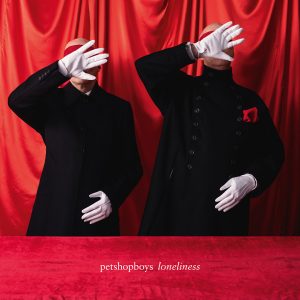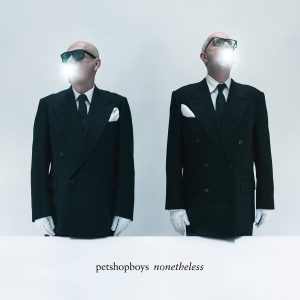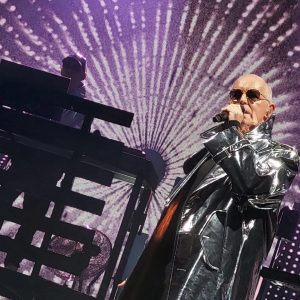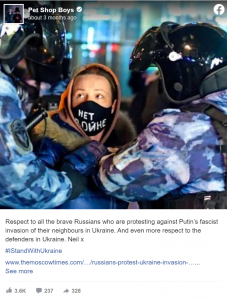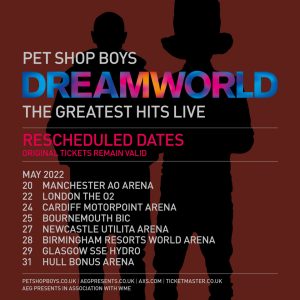A private Victorian dining room at London’s St Pancras Hotel makes a suitably grand setting for an audience with British pop institution Pet Shop Boys.
Not that award-winning duo Neil Tennant (58, elegantly suited) and Chris Lowe (53, yet almost boyish in a designer hoodie) will be stopping here long. They’ve just arrived back from a triumphant Manchester show on their extensive Electric tour and they’ll shortly be off for their next date in Tel Aviv.‘I read a recent concert review that said Pet Shop Boys don’t do very much on stage – Chris just plays keyboards and I stand there and sing,’ exclaims Tennant, mock-outraged. ‘He’s the keyboard player, I’m the singer; what do they expect us to do? Take our clothes off? Roller skate?’Frankly, stranger things have happened in Pet Shop Boys’ productions. An adventurous air has always stirred beneath their deadpan demeanour and their latest tour heralds the release of their 12th studio collection, also titled Electric. Both the concerts and the album have involved 35-year-old Brit producer Stuart Price (also famed for his work as Madonna’s musical director).Electric’s tracks – the racy Hi-NRG rush of Axis; the euphoria of current single Vocal; the ‘living for the weekend’ urge of Thursday (featuring a cameo from pop star/rapper Example) – form a sharp awakening after Pet Shop Boys’ reflective 2012 predecessor, Elysium.This album comes at a time of flux – it’s Pet Shop Boys’ first release on their own label since leaving British major Parlophone (recently bought by Warner Music), and it sounds like pop’s elder statesmen have reclaimed their roots on the dance floor.‘Elysium was about growing old,’ says Tennant. ‘Electric is about remembering that sense of youthful excitement. We’ve had two years of intensive writing and we thought we’d do a proper up-tempo dance album.’Club culture has been key to Pet Shop Boys’ music since the duo’s early 1980s Hi-NRG recordings with New York dance producer Bobby Orlando. They signed to Parlophone in 1985 and scored their debut hit, West End Girls, shortly afterwards but those underground obsessions still pulsed through their work: a fascination with nightlife and gay culture; imported vinyl and alternative versions.Pet Shop Boys arguably deserve credit for bringing club remixes to the mainstream; their successful Disco mix series began in 1986 and they’ve always enlisted pioneering DJs to rework their tunes. They’ve stayed in touch, even if they’re not always out all night.‘When you’re younger, you go clubbing every weekend, if not more often,’ says seasoned raver Lowe. ‘When you’re older, clubbing has to feel like a special event because you’ve done it so often – it becomes about a DJ you want to check out, or a country you haven’t been to before.’When was the last time Pet Shop Boys had a dance-floor epiphany? ‘Quite recently, listening to reggaeton music at a club that was quite a long drive through the Colombian countryside,’ says Lowe. ‘The rhythm and atmosphere were so infectious. We’ve also been listening to this minimal techno music coming out of northern Brazil, with very basic synths and drum machines.’‘These days, we often go to Berghain [the infamous Berlin club] on a Sunday lunchtime, or Gutterslut in east London,’ adds Tennant. ‘I personally like crazy nights with ridiculous drag queens, not people taking photos of the DJ all night.’The classic dance elements on Electric surely owe something to the fact that producer Price is a long-time Pet Shop Boys fan; Disco was apparently the first record he bought and his breakthrough musical guise (as pink-haired club artist Les Rythmes Digitales) championed 1980s-styled electronic production.‘We always thought we would work with Stuart,’ says Tennant. ‘Creating Electric was a real joy, quick and clever. It all flowed very freely and we weren’t bearing in mind any commercial restraints.’Price is more self-effacing. ‘I actually thought Pet Shop Boys were an unreachable entity and that if we did ever meet, it might be a bad idea to work together,’ he says. ‘But that couldn’t have been further from the truth. It felt like making a record for the first time – excitable and naive. With Electric, we never set out to arrange songs in a pop format, we just let them go where they wanted. That was liberating.’When it comes to working with your heroes, how do Pet Shop Boys compare to Madonna? ‘They have their similarities,’ says Price. ‘I think it comes from that early 1980s NYC music scene. They were all there, going to the same places, meeting the same DJs. On a practical level, all three of them like to leave the studio around 5pm, after some tea and a biscuit.’Pet Shop Boys never claimed to be rock’n’roll but they’re now more of an independent force than ever. If Electric was a nightclub, what kind would it be? ‘Probably one with waiters in goat heads wandering around serving cocktails, maybe a little like the Korova Milk Bar in A Clockwork Orange,’ muses Price. ‘Except with a belting sound system – and less killing.’‘It would have a lot of lasers on the dance floor,’ says Tennant, ‘and the crowd would be very mixed: young and old, straight and gay, rich and poor and everything in between.’
Taken from: Metro.co.uk
Interviewer: Unknown
